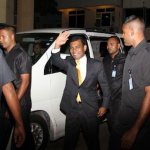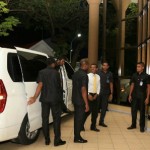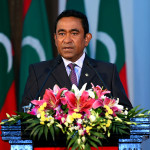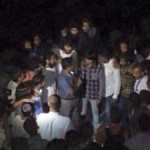President Mohmaed Nasheed took questions from the public on DhiFM’s one-to-one programme on Friday, the first ever live call-in radio show featuring a sitting president.
The president addressed a number of issues and answered questions on subjects ranging from the government’s pledges, the electricity tariff hike and media subsidies.
Hundreds of questions in the days before the show via email and text messages.
On his New Year resolution, the president said, “My determination and goal is finding ways to fulfil the government’s key electoral pledges.”
Some political parties wanted to overthrow the government, he said, but it could only be done within the bounds of the law.
On media subsidies, the president said he did not favour adding to recurrent expenditure and praised private broadcasters for their efficient operations with a small number of staff.
Asked about the government’s pledge to provide affordable housing, he said an agreement had been reached with India’s Tata Company but the project was delayed due to a dispute over the 11 per cent interest proposed by the company.
The government wanted to ensure that citizens would not have to pay more than Rf3,500 a month for the housing units, he said.
He added the government hoped to sign contracts with five companies this month to construct 4,000 housing units.
The president said he regrets that electricity tariffs had to be increased after he pledged not to do so during the campaign.
Apologising to citizens, Nasheed said the hike was temporary and referred to targeted subsidies introduced for poor income families.
On the campaign pledge to hold a mid-term presidential election, the president said the thinking behind it was to assess the political landscape in the country after emerging from a dictatorship where free and fair elections could not be guaranteed.
But, he added, the first opportunity to take stock of the support for political parties came during last year’s parliamentary elections.
“All political parties contested. Those who advocated for a mid-term election won only two seats. And of all those two seats, it is questionable to what extent they belong to the party,” he said.
Following the first round of the October 2008 presidential election, all opposition parties united around the Maldivian Democratic Party candidate and formed a coalition to end the 30-year rule of President Maumoon Abdul Gayoom.
Of the coalition partners, Dr Hassan Saeed, former presidential candidate and attorney general, now of the Dhivehi Qaumee Party, pushed the most for a mid-term election.
Nasheed said the parliamentary elections last year six months after the presidential election showed that support for the ruling MDP had not diminished.
In the May parliamentary elections, MDP won 51,184 votes while the main opposition Dhivehi Rayyithunge Party won 40,886 votes.
In his radio address on the same day, the president highlighted progress made on fulfilling the government’s five main pledges.
Transport networks had been established in some provinces, he said, while contracts will be signed for the remaining provinces.
He added the government was confident of completing a project for 1,000 housing units within this year.
The amount of drugs seized during the past year exceeded the previous three to four years, he said.
Moreover, two detoxification centres were established under the government’s policy of focusing on treatment and rehabilitation.
Providing universal health insurance under the Madhana programme will eliminate the practice of “begging for healthcare”.
It was essential to reduce the budget deficit to curb inflation, he continued, and the government had to reduce recurrent expenditure to bring down the deficit.






I quite like the idea of a sitting President going live on radio with phone-in from the public. Its a great opportunity for the President and the public. However, such a program would be a win-win only in the presence of a responsible, professional media. Nasheed has pulled a political tactic being on Dhifm - a local fm station owned by Gayoom's longstanding supporters Champa. I guess Nasheed used the opportunity to send a loud and clear message to the Dhifm audience. (The effectiveness of such an attempt can only be measured through a scientific method) If Nasheed's intention is to inform the public on how the government is going about fulfilling its pledges and establishing the much needed democratic institutions, his program should be followed systematically by government sources. If not whatever he says is twisted relentlessly against him to misinform the public as we have witnessed since Friday afternoon on local media. 99% of the time it is getting a Tom, Dick and Harry to say Nasheed has lied, gone back on his word or how ineffective he is. While this goes on the local media sits back comfortably watching and refusing to present objective information surrounding Nasheed's answers. The message can get lost easily, in the hands of this media!
The reason why the "message is getting lost" is because the media is all controlled by vested interests. That has been everyone's practice for the last couple of decades. Anytime anyone had something to say, they created a magazine or a newspaper. Today, those with influence and affluence have created television and radio stations. There are no independent news sources. There are now independent papers.
The only one that comes close is this one. And thats because it is edited by a foreigner who is replaced on an almost yearly basis. Anyone from Maldives is tied to its pulse, the beating web of interconnection which we're all apart of - more so than in any other country.
Shaya is right. the only solution to this problem is appointing Dr Shaheed as Chief Government Spokesperson.
On a tangent from the topic, with reference to the comment by Shaya, I recently heard local media personnel suggesting on a talk show on radio that they would like to be trained further. If memory serves me well, the gentleman was suggesting that with the Government's close ties with bilateral partners, they could perhaps facilitate access for journalists to various training programmes - I think there was specific reference made to India, where there were believed to be strong programmes. Perhaps this is an area that needs to be looked into urgently - building the capacity of media further to enable objective reporting and rational/effective ways of holding government and other public officials accountable in a professional and ethical manner.
I really wonder how is he doing this. This president is becoming stronger by day. One that is promoting this is the opposition media, parties. Look at how he is getting the message across. His level of thinking definitely unmatched with that of the opposition. The only drawback he is having is, to lower his thinking level to those in the opposition which from time to time has hurt him in the short run however always benefited in the long run.
President promises are very much related to the performance of the economy which has not done any favor to him so far. In this bad economic times, we have established institutions which cost us more than running of the government itself. Compare the budget of the presidents office that of a independant institution.
Maldivians are very like to have a president with the character he has. I am confident that he will deliver.
I highly praised DhiFm for their valuable effort in transforming the media in Maldives. The wily government influences the government media in every way they can. DhiFm is contributing critically to make the government accountable.